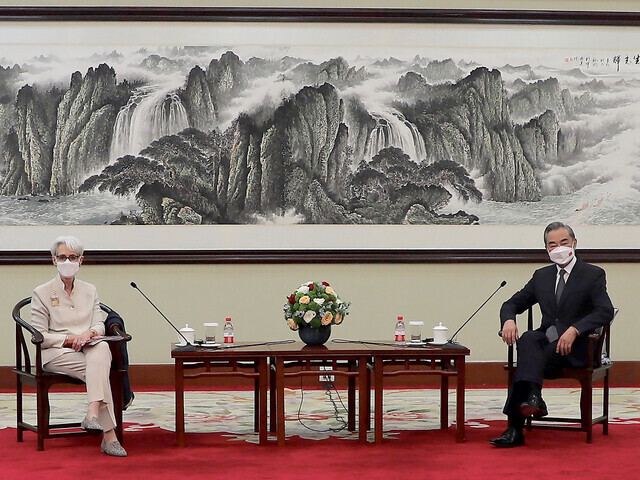hankyoreh
Links to other country sites 다른 나라 사이트 링크
China pushes US to accept three conditions for their bilateral relations

During high-level talks with the US that ended inconclusively, China pushed the US to accept three conditions for their bilateral relations. But the US maintained its current position while touching on sensitive issues including Xinjiang, Hong Kong and Tibet.
Chinese Foreign Minister Wang Yi met with US Deputy Secretary of State Wendy Sherman on Monday in Tianjin, China.
"In [the] face of severe difficulties and challenges in China-US relations, Wang said it requires serious consideration for the US side to make correct choices as to whether the bilateral ties will head to confrontation or improvement," China's state-run news agency Xinhua News said on Tuesday.
Wang mentioned three bottom-line conditions for effectively managing US-China relations. He said that the US must recognize the Chinese system, stop trying to impede Chinese development, and stop infringing on Chinese sovereignty or meddling in China's internal affairs.
"The United States must not challenge, slander or even attempt to subvert the path and system of socialism with Chinese characteristics," Wang said.
"The United States must not attempt to obstruct or interrupt China's development process. [. . .] China urges the United States to remove all unilateral sanctions, high tariffs, long-arm jurisdiction and technology blockade it has imposed on China as soon as possible."
Long-arm jurisdiction refers to the practice of regarding foreign countries as falling under the jurisdiction of domestic law.
Wang continued: "The United States must not infringe upon China's state sovereignty or even damage China's territorial integrity."
"Issues regarding Xinjiang, Tibet and Hong Kong have never been about 'human rights' or 'democracy.' [. . .] No country will allow its national sovereignty and security to be compromised."
"The fact that both sides of the Taiwan Strait belong to one and the same China and [that] Taiwan is part of China has never changed and will never change. If 'Taiwan independence' forces dare to provoke, China has the right to take any necessary measure to stop it," Wang said.
The view inside China is that the ball is now in the US' court. That suggests the future of the two countries' relationship will depend upon how the US responds to China's demands.
Quite a different mood was evident in the US. In a statement issued on Monday, the US State Department spokesperson said that Sherman, in her meeting with Wang, had voiced concerns "about a range of [Chinese] actions that run counter to our values and interests and those of our allies and partners, and that undermine the international rules-based order."
The statement added that Sherman had brought up a number of matters, including human rights abuses in Xinjiang, Hong Kong and Tibet; the Taiwan question; the East and South China Sea question; and investigating the origins of COVID-19.
By Jung In-hwan, Beijing correspondent
Please direct comments or questions to [english@hani.co.kr]

Editorial・opinion
![[Editorial] Penalties for airing allegations against Korea’s first lady endanger free press [Editorial] Penalties for airing allegations against Korea’s first lady endanger free press](https://flexible.img.hani.co.kr/flexible/normal/500/300/imgdb/original/2024/0502/1817146398095106.jpg) [Editorial] Penalties for airing allegations against Korea’s first lady endanger free press
[Editorial] Penalties for airing allegations against Korea’s first lady endanger free press![[Editorial] Yoon must halt procurement of SM-3 interceptor missiles [Editorial] Yoon must halt procurement of SM-3 interceptor missiles](https://flexible.img.hani.co.kr/flexible/normal/500/300/imgdb/child/2024/0501/17145495551605_1717145495195344.jpg) [Editorial] Yoon must halt procurement of SM-3 interceptor missiles
[Editorial] Yoon must halt procurement of SM-3 interceptor missiles- [Guest essay] Maybe Korea’s rapid population decline is an opportunity, not a crisis
- [Column] Can Yoon steer diplomacy with Russia, China back on track?
- [Column] Season 2 of special prosecutor probe may be coming to Korea soon
- [Column] Park Geun-hye déjà vu in Yoon Suk-yeol
- [Editorial] New weight of N. Korea’s nuclear threats makes dialogue all the more urgent
- [Guest essay] The real reason Korea’s new right wants to dub Rhee a founding father
- [Column] ‘Choson’: Is it time we start referring to N. Korea in its own terms?
- [Editorial] Japan’s rewriting of history with Korea has gone too far
Most viewed articles
- 160% of young Koreans see no need to have kids after marriage
- 2[Editorial] Penalties for airing allegations against Korea’s first lady endanger free press
- 3Months and months of overdue wages are pushing migrant workers in Korea into debt
- 4Bills for Itaewon crush inquiry, special counsel probe into Marine’s death pass National Assembly
- 5[Reporter’s notebook] In Min’s world, she’s the artist — and NewJeans is her art
- 6[Guest essay] Maybe Korea’s rapid population decline is an opportunity, not a crisis
- 71 in 3 S. Korean security experts support nuclear armament, CSIS finds
- 8S. Korea discusses participation in defense development with AUKUS alliance
- 9Cracks found in containment building of UAE nuclear power plant built by S. Korean companies
- 10At heart of West’s handwringing over Chinese ‘overcapacity,’ a battle to lead key future industries